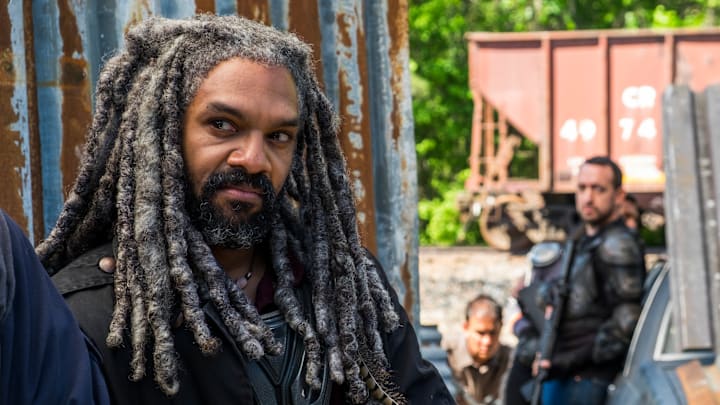"The King, the Widow, and Rick" is the sixth episode of the eighth season of The Walking Dead, which originally aired on November 26, 2017. This episode is notable for its focus on the fragmented leadership dynamics between the various communities that have banded together to fight the Saviors, led by Negan. Like many episodes of The Walking Dead, this one serves almost as a parable about division among leaders.
The title refers to three of the key leaders—King Ezekiel, Maggie (the Widow), and Rick. Each of them is dealing with their own challenges in this episode, thanks largely to their own decisions. For example, King Ezekiel is grieving the devastating losses from the previous battle, especially the death of his beloved tiger, Shiva by vicious walkers (who didn't need to be "biolumiscent" or "amped up").
https://ew.com/walking-dead-daryl-dixon-bioluminescent-zombies-exclusive-8715574
He also struggles with feelings of guilt and questions his role as a leader. It's a reminder that, quite often, acceptance is an internal struggle first, and an external one second. Meanwhile, Maggie is making tough decisions as the leader of the Hilltop communitym which she is obviously trying to save from total defeat (largescale death and subjugation under Negan).
She faces pressure about what to do with the Savior prisoners taken from prior battles. Then you have Rick, who continues to pursue his plan of forming alliances to finally bring down Negan, but he encounters resistance from the Scavengers, led by Jadis. This is all happening duriing a sustained battle tension with the Saviors.
The Walking Dead and yet more weighty decisions
Maggie’s storyline revolves around her decision on whether to execute or imprison the captured Saviors, showcasing the ongoing moral struggle between justice and survival in a post-apocalyptic world. These story elements are usually pretty good, and, on that note, there's a bit of an uncomfortable truth about this series: A significant part of what makes this show good is whether or not a viewer is prepared to even grapple with its little moral quandaries.
Mo matter how much some dislike the series past (insert season here], some fans remain engaged, because they care about certain questions. For example, some say: If The Walking Dead had begun from the perspective of the Saviors, we would have viewed Negan and his group as the heroes while Rick's group might be the antagonists. Others disagree, but this sort of debate is largely the point (though, of course, one might easily accuse the show of milking such debates for all they are worth).
Rick’s quest for allies
Rick heads back to the Scavengers (Jadis’ group) to convince them to join the fight against Negan. This is a continuation of his attempts to build a united front against the Saviors, but he ends up being captured instead. It's another moment of character development, especially in the context of having seen Rick devolve basically into "beast mode" before.
Similarly, Carol, who has had her own bloodthirsty moments, steps up to help Ezekiel reclaim his leadership and sense of purpose after his emotional withdrawal. It's an interesting examination of why leaders burn out. Also, Ezekiel is no doubt an example of a good leader who perhaps did the best he could, but just couldn't make things work out. Then there's Carl...
Carl Grimes' signoficant moment
Frankly, The Walking Dead had largely ignored Carl Grimes by this point in the series, so it is refreshing to see him actually engage more with actual events in a significant way. Carl Grimes has a significant subplot where he encounters Siddiq, a stranger who will later become important to the story, and their meeting emphasizes themes of trust and humanity in the apocalypse. Granted, it's far from a Carl-centric episode, but he at least reminds us he's there.
Parallel storylines
The episode splits its focus across multiple characters and locations, illustrating the increasing complexity of managing multiple communities, with various missions and decisions made by different factions as the war against the Saviors progresses. It's also more complex in tone than just saying "Negan is bad, M'kay? There are some more tones and themes to this one.
The episode emphasizes the toll that war takes on the leaders and their communities. It also delves into themes of leadership responsibility, loss, and the moral dilemmas involved in making decisions for the greater good. Again, questions about values and ethics are largely what make The Walking Dead interesting...well, that and the zombies (though they're not such a big factor in this episode). Though the Walking Dead universe ultimately expanded to New York City with Negan and Maggies and France, these were simpler times.
While not as action-packed as other episodes, "The King, the Widow, and Rick" provides insight into the psychological and emotional struggles of the leaders, further setting up the ongoing war with the Saviors and their "I am Negan" bullcrap.
